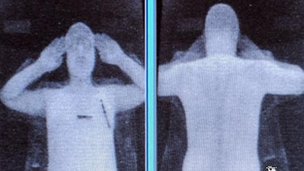Gli scanner elettronici come quelli utilizzati negli aeroporti non sostituiranno le strip search nelle prigioni dell’Irlanda del Nord

Tra gli oggetti non rilevati farmaci, batterie per telefoni cellulari, forbici e un coltello.
Quasi 1.200 detenuti e il personale penitenziario sono state perquisiti usando due scanner ad onde millimetriche.
Le ricerche hanno avuto luogo presso la prigione di Magilligan e di Hydebank Wood.
I prigionieri repubblicani detenuti nel carcere di massima sicurezza di Maghaberry hanno lottato a lungo per ottenere l’installazione di questi scanner in alternativa alle degradanti strip search.
Ma ogni tentativo di introdurre la tecnologia dovrebbe essere messa in attesa a causa dei risultati del progetto pilota, voluto dal ministro della Giustizia David Ford.
Un rapporto del Prison Service afferma che gli sanner hanno rivelato la presenza solo del 57% degli oggetti presi in esame. Tra gli oggetti invisibili allo scanner anche un coltello e delle forbici.
I detenuti perquisiti con gli scanner si sono offerti volontari, mentre tutti i materiali illegali rilevati durante il test sono stati trasportati dagli agenti di polizia penitenziaria che hanno accettato di far parte del progetto pilota.
Dirty protest
La relazione che illustra i risultati del progetto pilota sarà discussa oggi dai membri della commissione GIustizia a Stormont.
Nel documento si afferma che i test hanno rivelato limiti nella tecnologia utilizzata e che una perquisizione completa fornisce un livello più alto di affidabilità perché sono stati ritrovati un maggior numero di oggetti.
Il presidente della commissione Giustizia, Paul Givan (SDLP), ha visitato Hydebank Wood a inizio mese per vedere uno degli scanner in fase di test.
Ha detto che durante la sua presenza l’attrezzatura non ha rilevato “oggetti metallici, telefoni cellulari, batterie che con una perquisizione corporale sarebbero stati ritrovati”.
“Ciò aumenta il rischio e compromette la sicurezza del carcere, la sua introduzione a mio avviso sarebbe del tutto inaccettabile”, ha aggiunto.
Il vice presidente della commissione, Raymond McCartney (Sinn Féin), ha detto che questo non dovrebbe essere la fine della questione.
“Altre persone in altre giurisdizioni hanno trovato una via d’uscita, tutti concordano che la sicurezza delle carceri non può essere compromessa, ma penso che nel XXI secolo si può trovare un sostituto tecnologico”, ha affermato il parlamentare.
Nel mese di novembre 2012 i POW repubblicani di Maghaberry hanno terminato una dirty protest contro l’uso delle strip search.
All’epoca, fonti repubblicane affermarono che la mossa avrebbe reso più semplice l’introduzione degli scanner se i test di prova avessero avuto successo.
Il ministero della Giustizia nordirlandese adesso proseguirà con i piani per testare un altro scanner a raggi X più sofisticato.
Ma questi test non possono iniziare fino a quando non verrà concessa una speciale licenza, perché lo scanner utilizza radiazioni e questa tecnologia non è mai stata utilizzata in una prigione del Regno Unito.
Tratto da BBC News
Scanners ruled out for NI prison searches after pilot
Electronic scanners like those used in airports will not replace full body searching in prisons in Northern Ireland.
Items not detected included drugs, mobile phone batteries, scissors and a knife.
Nearly 1200 prisoners and prison staff were searched using two millimetre wave scanners.
The searches took place at Magilligan prison and Hydebank Wood.
Dissident republicans in the high security prison at Maghaberry, near Lisburn, County Antrim, have been campaigning to have the scanners installed there as an alternative to strip-searching
But any move to introduce the technology is expected to be put on hold due to the results of the pilot scheme, which was introduced by justice minister David Ford.
A prison service evaluation report says the scanners detected just 57% of test items. The items not detected include a knife and scissors.
Prisoners searched using the scanners had to volunteer to be part of the process, so all of the illegal materials detected during the test were carried by prison officers who agreed to be part of the trial.
Dirty protest
A report setting out the findings will be discussed by members of the justice committee at Stormont on Thursday.
It says the tests revealed limitations to the technology and that full-body searching provided a higher level of assurance because more test items were detected.
The DUP chairman of the justice committee, Paul Givan, visited Hydebank Wood earlier this month to see one of the scanners being tested.
He said the equipment that he witnessed in operation did not detect “metal objects, mobile phones, or batteries the way in which a full body search would”.
“It increases the risk and compromises the security of the prison, its introduction in my view would be wholly unacceptable,” he added.
The committee’s deputy chairman, Sinn Fein MLA Raymond McCartney, has said this should not be the end of the matter.
“Other people in other jurisdictions have found a way forward, everyone accepts the security of the prisons cannot be compromised, but I think in the 21st century we can find a technological replacement,” he said.
In November, dissident republican prisoners in Maghaberry ended a dirty protest against the use of strip searching.
At the time, republican sources said they hoped the move would make it easier for scanners to be introduced if the trials were successful.
The department of justice will now press ahead with plans to test another more sophisticated X-ray scanner.
But those tests cannot start until a special licence is granted because the process uses radiation and the technology has never been used in a UK prison.